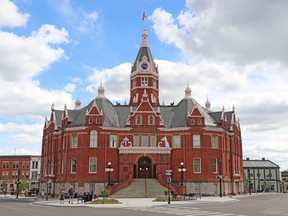Prof. Peter Wolstencroft says the decision seems to be an attempt to control speech

While the temporary ban on three Stratford residents ends next week, an expert has joined the call for city staff and council to provide answers on what exactly led to them being barred from municipal property.
Advertisement 2
Article content
Like many residents, Peter Wolstencroft, a political science professor emeritus at the University of Waterloo, said the actions by the city are “controlling and limiting speech.”
“There’s a lot of other stuff, but I think that’s what it’s actually focused on, but we don’t know. That’s what I find troubling about this, and we don’t know any (of the things) the citizens did that would lead to this action by Stratford,” Wolstencroft said.
“You can say ‘you’re guilty and this is the punishment,’ but that’s not sufficient. You need to say, in my mind, ‘you made accusations or threats, or you did this or that, and that’s not acceptable.’ So that’s the big issue for me, and I think for the citizens of Stratford,” the professor added.
Advertisement 3
Article content
Speaking to the Beacon Herald earlier this week, Mayor Martin Ritsma said he was unable to specify the exact actions or comments made by the residents – Mike Sullivan, Barb Shaughnessy and Ken Wood – at the February council meeting that prompted the bans since the decision was made by Stratford’s chief administrative officer (CAO) rather than council.
However, the ban and the respectful workplace policy that led to its implementation are “highly bureaucratized policy procedure,” so it’s not clear the role council played or whether they supported the ban, Wolstencroft said.
“I didn’t get a sense of what the actual role of the council was. Is the council supporting all of this or are they following the lead of the CAO? “It’s not clear to me who exactly is involved in this decision,” the professor added.
Advertisement 4
Article content
Given the demands for greater transparency, Thursday night’s public meeting on the proposed Krug factory development is an example of how it should work, Wolstencroft noted.
“They were going through all kinds of different issues citizens were raising, and the council has to make a decision in light of those comments when the time comes, and do it openly. So, that’s what we understand by transparency. “There’s no transparency (in the bans),” he said
Despite several decades in the political sphere, Wolstencroft said he was unaware of any prior precedent of citizens being banned from municipal buildings and council meetings. There are cases of council meetings getting violent, as well as incidents of citizens yelling at politicians and politicians yelling at each other, but this ban, he said, is new.
Advertisement 5
Article content
“Occasionally, these things happen, but nothing like this, not to my mind,” he said.
Recommended from Editorial
A similar example that Wolstencroft could provide occurred in January 2022, when former English teacher Carolyn Burjoski was removed from a Waterloo Region District school board meeting while presenting on books she felt were inappropriate for elementary school children. While Burjoski’s later bid to finish her presentation has been dismissed twice in court, the board was ordered to pay $30,000 in legal fees while her $1.75-million lawsuit is still ongoing.
Later in 2022, the Waterloo Region board banned one trustee, Mike Ramsay, from its meetings for three months in a 6-3 vote after it ruled he violated its code of conduct through comments and social media posts supporting Burjoski. Ramsay’s request for a judicial review was dismissed last December.
Advertisement 6
Article content
The Waterloo school board has since passed a motion to limit the length of time that a delegate can speak while also requiring a written copy of the presentation before the meeting.
“So that’s a control device, and I think what they’re trying to get away from is 50 people saying the same thing,” Wolstencroft said.
Even though the ban of Sullivan, Shaughnessy and Wood is set to end in the near future, litigation – Sullivan and Shaughnessy have hired lawyer David Donnelly – is still ongoing. Regardless of the length of the ban, Wolstencroft said it remains a serious matter that staff and council should be challenged on.
“They would want to make a point. It may happen again . . . so I guess that’s also a measure of how seriously they take this, and I would take it very seriously,” the professor explained
Despite this tension between residents and council, the ban may not be a factor in the municipal election that’s set for October 2026, Wolstencroft said
“So what do people think is important in Stratford? The conduct of city council meetings for most people is not something that they think about or worry about. They should,” he said.
Article content

